Iran Leader Urges Muslim Nations To Reinforce Palestinian Groups
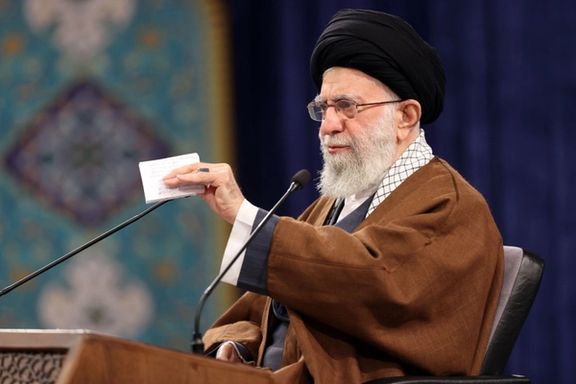
Iran’s Supreme Leader Ali Khamenei says the strategy of the Muslim world should be reinforcing the militant groups in the Palestinian territories.

Iran’s Supreme Leader Ali Khamenei says the strategy of the Muslim world should be reinforcing the militant groups in the Palestinian territories.
Khamenei said in a Saturday meeting with regime officials and ambassadors of Muslim countries that Israel is gradually collapsing, and the Muslim nations must focus on supporting the militant elements in and around Israel.
While renewing his support for jihadists in Palestinian territories, Khamenei alleged that “The downfall [of Israel] which started a few years ago, has now accelerated and the Muslim world must take advantage of this great opportunity.”
Earlier, an Iranian IRGC Commander also hailed Palestinian terror groups, claiming 10,000 attacks have been perpetrated against Israelis this year.
Ramazan Sharif, the head of the Intifada and Quds Central Headquarters of the Islamic Propaganda Coordination Council, said earlier this month that the formation of a unified anti-Israeli front from South Lebanon and the Syrian Golan Heights to Gaza and the West Bank has challenged Israel more than ever.
Iranian proxies in Gaza, Lebanon and Syria have all recently attacked Israel with rockets as tensions simmered during the holy month of Ramadan.
Khamenei said in 2016 that Israel must be destroyed in 25 years and the government even set up a countdown clock in Tehran the following year.
Many Iranians mock the anti-Israel rhetoric and the ticking clock, but the regime is adamant in repeating its threat.
Iranians who have been periodically protesting against the regime since 2017, often chant slogans against spending Iran's national wealth to create and support proxy groups.
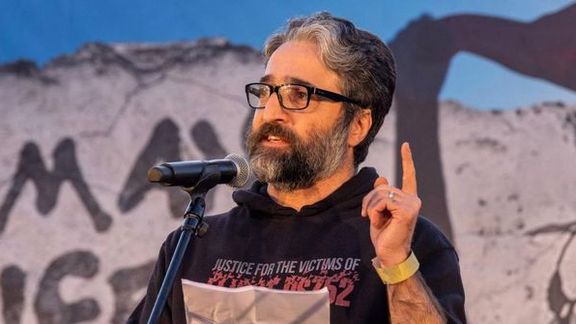
The resignation of Hamed Esmaeilion from the Alliance for Freedom and Democracy in Iran has sparked bitter arguments between monarchists and his supporters.
In a post entitled “Report to the People” Friday, Canada-based activist Esmaeilion announced that he has left the alliance. The council consisted of the exiled Prince Reza Pahlavi, Nobel peace prize laureate Shirin Ebadi , US-based author, journalist and women’s rights activist Masih Alinejad, actress and activist Nazanin Boniadi and Secretary General of the Kurdish Komala Party Abdullah Mohtadi and Esmaeilion.
Boniadi recently deactivated her social media accounts without any explanation and appears to have withdrawn from the alliance too. Alinejad, Mohtadi, and Ebadi have so far not commented on Esmaeilion’s resignation.
The alliance announced its existence in a February event at Georgetown University and issued its charter, the Mahsa Charter, in early March and its members said they had agreed on “minimal positions” that could create the most consensus among the opposition.
Esmaeilion said he joined the opposition in exile council hoping to help create a platform for dialogue and cooperation among various opposition factions but the lack of democracy and transparency in the council and the “domination” of one member over the others disillusioned him.
He claimed that he had tried to keep away from “conflicts, pressures and illogical demands” but was impeded by “pressure groups from the outside” who kept trying to impose their own views on the coalition by “undemocratic methods".
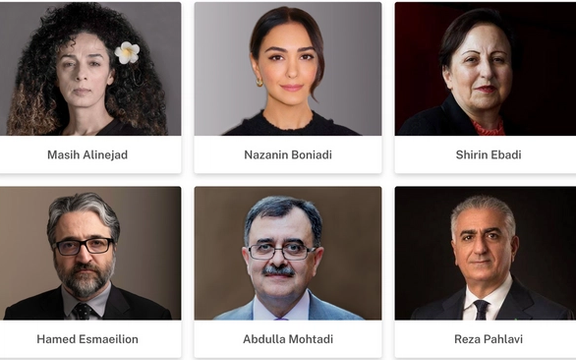
Supporters of Esmaeilion, Alinejad, and Mohtadi have long been accusing the supporters of the exiled Prince of harassment on social media and efforts to defame them. Prince Reza Pahlavi has on some occasions advised his supporters to be more tolerant of others but the disputes and attacks on social media only got worse. They often accuse Prince Reza Pahlavi’s supporters of trying to present the him as the only legitimate leader of the opposition.
Supporters of the Prince who call themselves ‘constitutionalists’ are staunchly against establishing a republic of any form in Iran, particularly federalism, seek the revival of a constitutional monarchy and the Iranian Constitution of 1906. They allege that others, Esmaeilion and Alinejad in particular, have views that will lead to the loss of Iran's national integrity.
Constitutionalists have been particularly angry recently because they believe that Esmaeilion and possibly Alinejad have prevented the Prince from including some opposition figures close to him in the coalition– particularly London-based journalist Amir Taheri, the US-based Amir-Hossein Etemadi, a member of the Frashgard group, and Germany-based musician and activist Shahin Najafi.
"Imposing opinions is not democratic, and the consensus of a group’s members, not just one member, is a precondition of a democratic movement," Esmaeilion wrote without naming Prince Reza Pahlavi directly while further suggesting that there have been efforts to “eliminate” others and impose certain views on others.
He also opined that the opposition abroad should only help to empower the people of Iran, their networks and organizations and that he would personally continue helping young pro-democracy Iranians abroad to organize and work on “unrestricted internet and several other projects” with them.
His critics respond that the six-member council was self-appointed, and no one got elected to block others from joining.
Some social media users have also suggested that the reason for Esmaeilion’s departure from the alliance at this time could have been his opposition to the Prince’s recent visit to Israel.
“Timelines are filled with Esmaeilion’s worthless tweet exactly when articles and tweets must focus on the important and taboo-breaking Israel visit of the Iranian monarch, Prince Reza Pahlavi, and the impact of this visit today and after the reclamation of Iran [from the Islamic Republic]. Isn’t it interesting?” one of the Prince’s supporters tweeted.
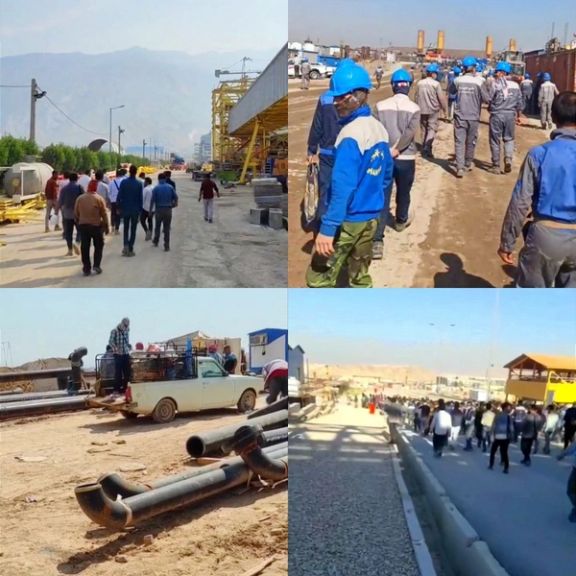
Workers of the oil, gas and petrochemical industries in Iran have gone on strike demanding wage increases in the face of more than 50 percent annual inflation.
Countless contract workers in oil, gas, petrochemical and steel industries in the southern cities of Asaluyeh, Dehloran, Gachsaran, Kangan, etc., stopped working on Saturday demanding a raise based on their proposed list which should be 79%.
At the same time, a conference was held in the city of Cologne, Germany, to express support for trade and civil unions of Iran.
According to reports, over 80 parties and organizations as well as 1,500 activists supported the initiative by the conference.
Back in February, twenty independent trade unions and civic institutions in Iran jointly published a charter, outlining their main demands to end the current inhumane situation.
Wages for most workers are around $120-150 a month, while a family of four needs $450 for its bare minimum needs.
In a statement, they said that 44 years after the establishment of the Islamic Republic the country's economic, political and social situation has plunged into a "vortex of crisis and disintegration."
They added that no clear and attainable prospect can be envisioned to end the current situation within the existing political framework, calling for building a new, modern and humane society after the Islamic Republic.
Outlining 12 main demands, they called for the release of all political prisoners, prohibition of criminalizing political, union, and civil activities, public trial of the leaders and perpetrators of the violence against protesters, unrestricted freedom of opinion, expression and thought, assembly, and social media as well as policies to preserve natural resources and ending environmental degradation.
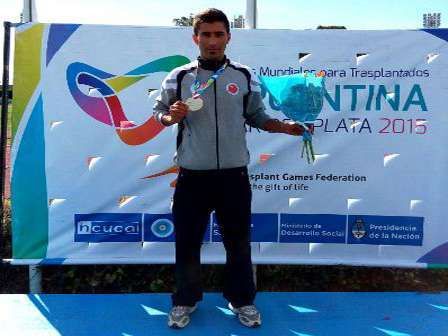
A member of Iran's National Transplant team, who had participated in the 2023 World Transplant Games, and a cross-country skier have applied for asylum abroad.
Reports received by Iran International say Saeed Montazer Parchi, who won five medals in the Transplant Games competitions held from April 15 to 21 in Australia, refused to return to Iran.
So far, he has participated in five rounds of these games, winning medals in track and field. He was also a member of the Iranian transplant national football team in the 2020 and 2022 World Cups.
Meanwhile, Sattar Seid, a cross-country skier, who represented Iran in three Winter Olympics, announced he is seeking asylum in Norway.
In a video published on Saturday, he said “Given the problems we had in the ski federation in the past year, I decided to continue my professional career in Norway."
It is not the first time Iranian athletes leave their teams during international championships and seek asylum in other countries.
About 30 Iranian athletes in recent years have defected from Iranian national teams and sought asylum in other countries, including Judo champion Saeid Mollaei, Greco-Roman national team wrestler Ali Arsalan, and many others, due to alleged threats and corruption in sports federations as well as Iran’s policy of not allowing athletes to compete against Israel. For women mandatory hijab is also an issue.
Iran is a sworn enemy of Israel, calling for its destruction and prohibits sportspeople from playing against Israeli competitors. There is no legislation banning athletes but under pressure from federation officials, they usually lose games intentionally, forfeit matches or claim injury to avoid facing Israelis.
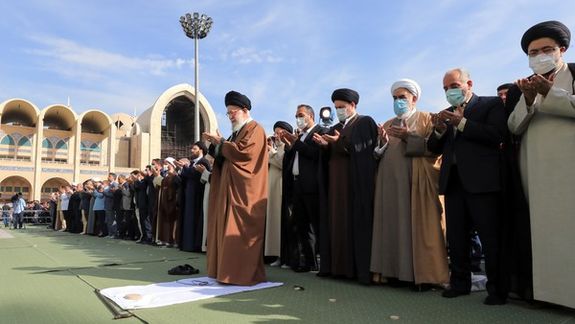
Ali Khamenei, Iran’s 83-year-old ruler, has called on the three branches of the government to cooperate, signaling differences among his hardline loyalists.
In his speech on the Muslim holiday of Eid al-Fitr Saturday, Khamenei urged the Judiciary, Executive and Legislative branches “not to obstruct one another” and not to waste time by focusing on “marginal controversies.”
Khamenei, whose regime faces serious economic and political crises, tried to sound hopeful by saying that a strong will can help overcome hurdles.
“By reinforcing our will, we can overcome the problems facing the country and if the three branches cooperate, we will not encounter difficulties,” he told officials and regime insiders who were all present in the ceremony.
As problems have become more serious for the regime, it is becoming increasingly more difficult for the governing hardliners to evade responsibility, especially for members of parliament who have little to show after three years into their term. Elections are approaching next March, and lawmakers have to answer to the people for the current economic disaster.
The national currency has halved in value since August and inflation seems uncontrollable, hovering well-above 50 percent.
As a result, some hardliners have begun criticizing President Ebrahim Raisi and threatening to impeach his ministers.
Khamenei’s call for unity and cooperation should be seen in this light and as an attempt to close ranks in the face of months of popular protests and seemingly unsurmountable problems.
The aging autocrat, ruling Iran since 1989, also asked the people not pay attention to “marginal controversies,” warning them that “enemies” want to divide the nation.
The word ‘enemy’ is a permanent fixture in Khamenei’s speeches, referring to the United States and Israel, an in some instances to European powers. It was no different in the Saturday speech when he used the term 12 times.
Having seen nationwide anti-regime protests for weeks from September to December 2022, Khamenei wants people to ignore criticism directed at the Islamic Republic and show “unity”, which for him means loyalty to the regime.
Khamenei, his top officials and the vast media propaganda machine try to portray dissent in the country as a ploy by the “enemy.” He repeated this conspiracy theory in his speech.
“The enemy is opposed to the unity of the Iranian nation…The enemy wants the people to fight each other for their different opinions and preferences,” he said calling on the people to show love and tolerance toward each other.
However, security forces under Khamenei’s command have killed more than 500 protesters since September simply for trying to express their opinions.
Khamenei also argued that “Islam’s enemies have realized that military force is not effective” and now they use other methods to dominate.
“Terror, distortion, lies, enticements…sowing pessimism among nations…are their tactics today,” Iran’s Supreme Leader said.
In a separate meeting with ambassadors from Muslim countries on the Eid occasion, Khamenei raised another favorite topic of his, by praising “the Palestinian resistance” and claiming that recent events have proven that Israel has “lost the power of deterrence.”
Serious military clashed took place earlier this month between Israel and militant forces backed by Tehran. Iranian officials have boasted of having supported these forces to create instability for Israel.
In the his address in the meeting Khamenei reiterated, “This important achievement is due the resistance of Palestinian youth, and the strategy of the Muslim world should be to help and reinforce combatants in Palestine.”
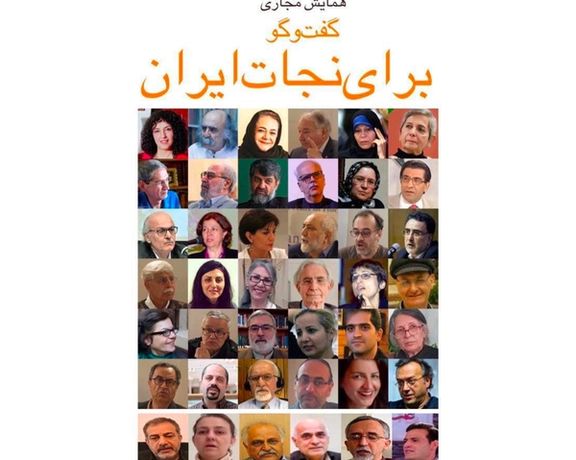
Over 40 political, social and human rights activists from inside and outside Iran for the first time attended a virtual conference called “Dialog To Save Iran”.
The meeting, which was held on Club House social media platform Friday, also heard from eight detained activists who sent messages from inside prisons in Iran.
Hashem Aghajari, a political activist and university professor referred to the last statement of the Green Movement leader Mir-Hossein Mousavi saying that with a deep understanding of the changes in Iranian society, Mousavi came to the conclusion that reform through electoral mechanisms is impossible.
Back in February, Mir-Hossein Mousavi, who was a presidential candidate in 2009 and has been under house arrest since 2011, issued a statement saying that the rulers of the Islamic Republic are not willing “to take the smallest step to meet the demands of the people.” He further added that Iran needs a “fundamental change” based on “Woman, Life, Freedom” motto and constitutional change.
Meanwhile, Mehrdad Khansari, a political activist and former diplomat, emphasized that Iran is facing a huge crisis adding that a strong front must be formed inside the country to challenge the regime.
In a message from prison, Keyvan Samimi, a journalist and political activist, who was rearrested Thursday, said Iranians inside and outside the country should form a united national front to get rid of oppression.
Imprisoned human rights activist Narges Mohammadi also said in a message that “To save Iran, we must end the tyrannical, anti-woman regime and make a peaceful and low-cost transition for the people.”